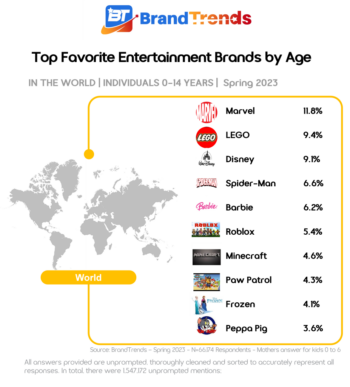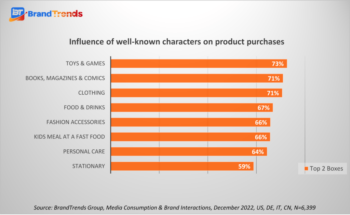By Gary Symons
TLL Editor in Chief
The market research company BrandTrends has released a new type of licensing software, based on the analytical power of artificial intelligence.
Called License Selector, the licensing-focused AI bot is accessed through a simple query interface called Millie, which allows the user to ask a question about various brands, and receive an answer that reveals whether that brand is a good fit for their company, how it performs in various markets, or even to provide a list of which brands would make good partners for their customer base.
TLL took a test drive of the software for the purpose of this article, and while the software is at an early stage, it’s ability to quickly and accurately provide actionable insights was very impressive. We asked for a list of best brands for a specific region and demographic for our fictional licensee, and within roughly 30 seconds received a report that contained a list of recommended brands, along with the analysis behind those choices.
 Customers who already work with BrandTrends can take comfort in the fact the AI’s analysis is based on the company’s vast database of consumer information, which contains millions of surveys and billions of data points.
Customers who already work with BrandTrends can take comfort in the fact the AI’s analysis is based on the company’s vast database of consumer information, which contains millions of surveys and billions of data points.
“Essentially, License Selector operates in a very similar way to do what licensing consultants would do, but it does that analysis very quickly,” says CEO and founder Philippe Guidaneau. “The difference is really that, instead of spending hours or days in gathering the information, and then structuring the data, and finally writing out all the answers yourself, you get the answer in roughly 30 seconds.”
License Selector and Millie (named after Guidaneau’s oldest granddaughter) is an interesting addition to the services BrandTrends already provides. Guidaneau worked for many years for other large market research companies, including analysis of the toy industry for NPD (recently acquired by Circa).

He then founded his own company under the name Kids Global, providing new types of market research by acquiring vast amounts of consumer data. The service quickly grew in popularity, and before long companies in other sectors were knocking at Guidaneau’s door, asking for similar research.
BrandTrends was born to meet that need, but Guidaneau could already see that the role of data in market analysis could be greatly improved by applying the computational power of artificial intelligence to more quickly and reliably interpret market data. The ability of generalized AI bots like ChatGPT convinced him the time is now to provide that service, and earlier this year the BrandTrends team unveiled License Selector at a special event at Licensing Expo.
“The truth is, I have always been fascinated by new technologies and I love mathematics,” Guidaneau says. “The idea of adopting AI initially came from that, but the more I was digging into it, the more I became convinced that if we don’t switch to an AI-enhanced model, our job of providing structured data is going to shrink, and chances are that companies of our size could even cease to exist.
“We want to be on the right train when we travel into the future of our industry, and if possible, we want to drive that train!”
At the moment, License Selector provides three categories of market research, Guidaneau says, although at two more will be added in the near future.
The first is called Optimal License Selection, “…which allows to identify the best potential licenses for a category of products or certain types of manufacturers, and for wherever it is in the world among 40 different countries,” Guidaneau says.

In our test, we were able to punch out a report that not only identified the top licensed brands for our theoretical licensing deal for kids, that also included the type of analysis one would need to pitch the idea to the top brass at a typical large licensee. Inherently lazy by nature, I was picturing myself drinking a mimosa in my hammock while License Selector did all the work.
The second research category is called Brand Excellence. “It’s about the strengths and weaknesses of the brands, by themselves or against the competition,” Guidaneau explains. “You can use this to complete a brand performance review, just for example, on Bluey or CoComelon or Paw Patrol, and you can also make a comparative analysis of the three brands.
“Which one is the strongest in a particular region, which is the weakest, and what are the pluses and minuses for each of these brands.
“This one is already up and working, but it is also developing more and more as the analysis behind that is becoming more sophisticated over time.”
The third category of AI query on the Millie page is dedicated to analyzing brands in the Entertainment & Character sector, and is used under an agreement for members of the international licensing association.
“The third one is for the Licensing International members, and in fact we’ve got this section named ‘Licensing International’,” Guidaneau says. “Using this query we can look at favorite properties for the Licensing International members, where you can create rankings of cartoons, TV shows, movies, celebrities, social influencers, and so on, and at the same time, you can also show some trends.

“For example, if you want to look at the top properties you would not see the smaller, trending properties, but using the query you can identify the ones that are just emerging, and that could in future become very strong brands.”
BrandTrends is also working on two new categories of queries that it hopes to make available very soon.
“One will be about industry trends, so it is like the Licensing International trends (query box), but using the other sets of data we have for other (licensing) categories,” Guidaneau says. “The other one will be called Predictive Insights, using the data to try to predict what will happen with various aspects of licensing in the near future.”
One of the interesting aspects of License Selector is that the AI not only uses the data that BrandTrends has collected through the years, but also looks for information from other sources to further verify its analysis.
For that reason, Millie is apparently an avid reader of The Licensing Letter!
“Yes, that’s true,” says Guidaneau. “Of course, we work to ensure the sources are vetted before they are used by our AI, because it’s the quality of the data that’s important, and the more information you provide, the better it is.”
The service has only been up and running for a short time, but it’s seeing good adoption by the industry.
Guidaneau says he believes the primary customer base for License Selector will be the world’s licensees, who need that type of intelligence to choose the best brand or licensor.
Licensors and licensing agencies wouldn’t need that information as much, but they would likely use License Selector to help determine the relative strengths and weaknesses of their own brands, or the brands of their competitors in the markets in which they compete.
Guidaneau says the business model for License Selector will evolve over time, particularly since the cost-per-user of providing the service drops as more people use it. At the moment, people and companies who have a subscription with BrandTrends will pay only a small fee that covers the server cost for the analysis provided by the AI. Customers who don’t have a subscription will be able to buy tokens that are used to pay for the various services.
“On the site you can purchase a number of tokens, and then if you want to do an Optimal License search, that would cost a certain number of tokens, or if you want to do a brand performance review or brand comparison, that would costs a different number of tokens,” Guidaneau explains. “We understand, of course, that some companies may only want to use the service once a year or once a month, while others may need to use it on a constant basis, so we fit the model to the client’s needs.”
To learn more about License Selector, go to the company’s website: brandtrends.ai
Bravado: Building Lasting Relationships in the Music Licensing Sector
